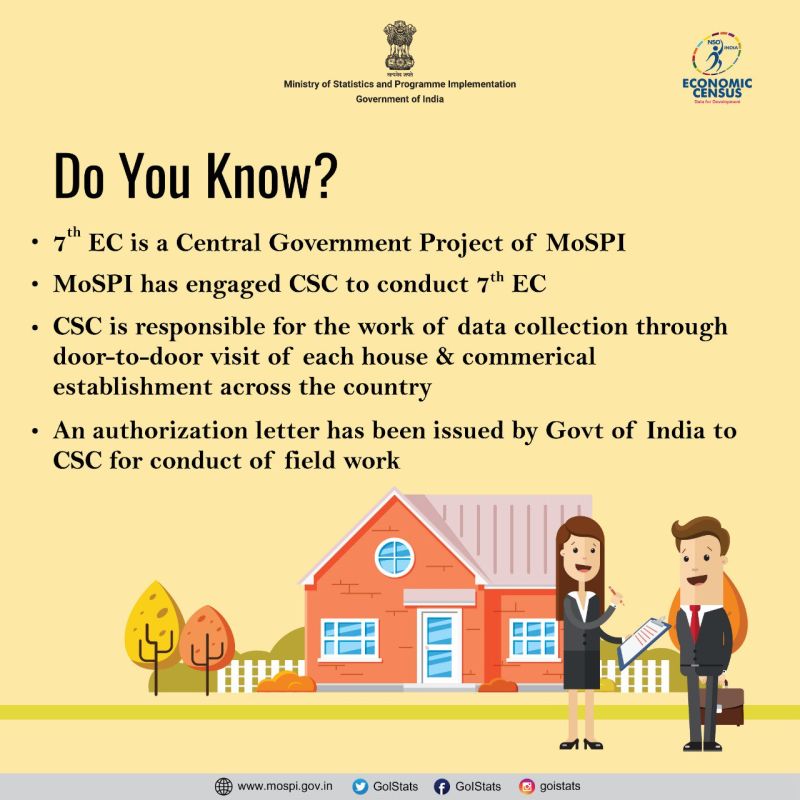1

PIB India
The Seventh Economic Census (7th EC) 2019 under the aegis of the Union Ministry of Statistics and Programme Implementation (MoSPI) was launched on August 26 in Nagaland. The MoSPI has partnered with CSC e-Governance Services India Limited, a Special Purpose Vehicle under the Ministry of Electronics and Information Technology, as the implementing agency for 7th EC.
The fieldwork of 7th EC was first launched in Tripura on July 29 and all other States/Union Territories (UTs) will start the process in August/ September. The data collections will culminate in December.
In Nagaland, CSC has engaged 1,252 enumerators and 305 supervisors for the fieldwork and they will cover 2,264 enumeration areas – 1,481 rural and 783 urban areas.
What is in economic census then? The Morung Learning gives a lowdown on its meaning, history and scope.
Economic Census
Economic Census is a complete count of all economic units in the country. The first EC was conducted throughout the country, except Lakshadweep in 1977. The subsequent Censuses were conducted in the years 1980, 1990, 1998, 2005. The 6th and the last census was conducted in 2013, in collaboration with the States/ UTs.
After completion of data collection and processing, the statistical results of 7th EC would be released. The Data collected, according to the Ministry, will be kept strictly confidential and used only developmental planning and statistical purposes by State/UT and central Governments.
Scope and Coverage for 7th EC
According to the MoSPI, all establishments including household establishments, engaged in production or distribution of goods/services (other than for the sole purpose of own consumption) in agricultural (except crop production and plantation) and non-agricultural sector (except those engaged in public administration, defence, compulsory social security, activities of households as employers of domestic personnel, activities of territorial organizations and bodies and illegal activities) will be counted.
Establishments with fixed structures will be covered at the place of their operation. On the other hand, entrepreneurial activities that are carried out without any fixed structures will be covered at the place of the residence of the owner. All types of establishments (perennial, seasonal and casual), existing on the date of data collection, though may not be in operation on the day due to certain reasons, will also be covered in the economic census.
Urban Area: An Urban area is classified based on the following criteria:
1. All places with a municipality, corporation, cantonment board or notified town area committee, etc.
2. All other place satisfying the following three criteria simultaneously:
• A minimum population of 5,000
• At least 75% of male working population engaged in non-agricultural pursuits
• A population density of at least 400 per sq. km.
The first category of urban units is known as Statutory Towns while the second category of towns is known as Census Towns, identified based on last population Census.
Rural Area: All areas, which are not identified as urban. The basic unit for rural areas is revenue village
EXCLUSIONS:
There are 3 kinds of exclusions in the 7th Economic Census, viz., (i) Based on Type of
EC House, (ii) Based upon certain type of households, and (iii) Based upon certaintype of Economic Activity.
- Government offices that are engaged in public service will not be enumerated in the 7th EC.
- Primary sector activities such as Agriculture crop production & plantation are excluded.
- Defence establishments, para military organizations & some other bodies are excluded.
- All International organizations such as UN bodies, OPEC & similar organizations are also excluded from this census
- Households comprising of members whose only means of income is wage or salary are excluded.
- Households comprising foreign nationals only will not be enumerated.
- Barracks of military and para-military forces (like Army, BSF, and Police etc.) are outside the economic census coverage. However, civilian households residing in their neighborhood including the family quarters of service personnel are to be covered.
- Floating population, i.e. persons without any normal residence will not be enumerated.
- Households which do not live in buildings but live in open or roadside, pavements, in hume pipes, under flyovers and staircases, or in the open places of worship, mandaps, railway platforms etc. are to be treated as houseless households and such households will not be covered in EC.
- The inmates of institutions like Orphanages, Nari Niketans etc. may not be enumerated as single member households. Such institutions themselves will qualify as establishments.
- Under trial prisoners in jails and indoor patients of hospitals, nursing homes etc. are to be excluded from 7th EC. They will be considered as normal members of their parent households and will be counted there. But households of residential staff of jails, hospitals, etc. will be enumerated. Convicted prisoners undergoing sentence will not be considered in the economic census.
- Establishments (with no permanent structure) of shelter-less and nomadic population which keep on moving from place to place and camp either without shelter or with make-shift shelter are not covered.
- Establishments engaged in some activities like smuggling, illegal gambling, beggary, prostitution etc. are not to be covered.
- Domestic servants whether they work in one household or in a number of households are not being considered as running establishments. Similarly, drivers who undertake jobs for others on wages will also not be treated as having establishments.
- All wage paid employees are not considered to be running establishments.
- Household members engaged in household chores are not considered to be running establishments.
- Persons doing different types of jobs depending on the availability of work e.g. loading, unloading, helping a mason or a carpenter, doing earthwork for a contractor should not be taken as running establishments since they do work on wages.
- Households working for others and earning some money (insignificant) should not be treated as engaged in entrepreneurial activity.
- Households in which none of the members is engaged in any economic activity i.e. household depending on remittances, rent, interest, pension etc. will not be treated as engaged in entrepreneurial activity.
(With inputs from ‘Economic Census 2019 - Schedule, Concepts, Definition and FAQs’ Ministry of Statistics and Programme Implementation Seventh)






